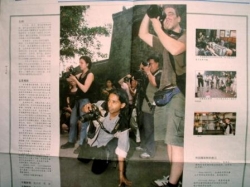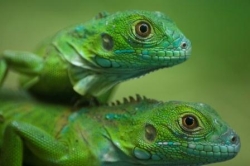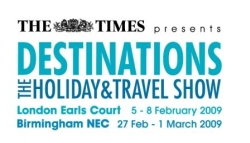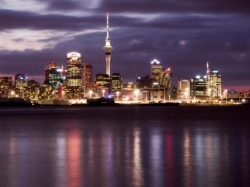 Regular contributor Mac this time interviews the Beetle via an email loaded with interesting travel questions. What do you think – are the Q&A something we should see more of in future editions of the eNewsletter ?
Regular contributor Mac this time interviews the Beetle via an email loaded with interesting travel questions. What do you think – are the Q&A something we should see more of in future editions of the eNewsletter ?
The Ant
Who am I ?
A Chartered Accountant, or CPA in American terms. I used to have my own consultancy business specialising in strategy, business turnaround and performance improvement. I’ve been lucky enough to live and work all around the world – earn money then spend it by travelling. I am now a cheese maker in the North Yorkshire Dales trying very hard to turn around my uncle’s business and make mostly goat’s cheese.
1. What countries did you visit and what time frame ?
About 100 over around a 20 year timeframe. Since Nov 2006, with the exception of Cuba I haven’t been anywhere because of my cheese business and any spare funds are going in to doing my house up which is a statement to the 1970s!
2. Which countries were you the most glad you saw ?
Papua New Guinea, Burma, Bali, Bolivia, Peru, Argentina, Chile, Venezuela, Bosnia, Tonga and I love Miami where I lived for a year 1999 – 2000. Borneo, though it comprises three countries, I lived in Brunei and was lucky to have time to travel around and do some fabulous diving. The north of Pakistan was a real eye opener, so beautiful, incredibly friendly people, I’d like to go back.
3. Which sights did you enjoy seeing most ?
So difficult to answer, there have been many. The walk from Grand Baie to Pereybere in Mauritius. The scenery of Camiguin, Philippines; the coral reefs around Papua new Guinea. South America is my favourite continent ever, I took 9 months out and backpacked around by myself, and had just the best experience ever. The temples of Bagan in Burma and travelling around Burma generally. I love Bangkok having lived there a short while, a great city to live in. I like the main square in Marrakech, always so vibrant and full of life and wonders. The Khyber Pass because it was a hell of an experience getting there.
4. Which waterfall did you enjoy most ?
In Venezuela, lots of little ones. The Angel Falls in Brazil/Argentina, though were disappointing. There are some lovely ones in the Kakadu Nat Park and around St Katherine’s Gorge.
5. Which country was the most different than your preconceived idea ?
Brunei – a mixture of opulence and third world. Burma made beautiful by the people. The Hawaiian Islands with the exception of Molokai and Kauaii were so commercialised and expensive. But Bora Bora was the biggest disappointment – a huge rubbish tip in the middle, in fact I would not give Tahiti a second thought now that I have been there, Papete the capital is not so nice either.
6. Which game parks did you like most ?
Berenty in Madagascar – a national park not game park. For game park, then without doubt, the Massai Mara in Kenya.
7. Which countries would you like to revisit ?
New Caledonia though a department of France. The north of Pakistan, it is so beautiful. Madagascar. I’d love to go back to Peru, Bolivia, Chile and Argentina. Vanuatu to dive again, fantastic and if we are talking about diving, then definitely Papua New Guinea again for diving.
8 In which country were the people the most friendly ?
Burma and Bali without a doubt and New Zealand too.
9 Which least friendly and helpful ?
China, Hawaiian Islands, India
10 Which country would you not particularly like to revisit ?
China and India
11 Which country the easiest to visit ?
Most are pretty easy
12 Which countries the best bargains and cheapest ?
US, Bangkok, Singapore
13 Which airlines did you like the best and which the least ?
Not keen on any but would avoid any American based airlines if I could.
14 What travel items you took with you used the most and were most glad you took ?
Lonely Planet and a laptop
15 Which travel guide books did you take and which did you like best ?
Lonely Planet, don’t like Rough Guides
16 Were you ever uneasy on your trip ?
Yes, in Zanzibar, also held up at machete point twice in Mozambique. The capital of Madagascar, Antananarivo can be scary and Port Moresby is horrendous. I lived in Karachi for a year and I got used to it but would not recommend it. Felt uneasy in Kandy too. I didn’t like parts of Lima but otherwise, did not have one bad experience of south America at all, perhaps I was lucky. I would never return to Zambia, nothing but bad memories and experiences.
17 Were you ever sick on trip ?.
The last time was in Syria and Jordan where I picked up amoebic dysentery. Not a great experience, but it was a good 15 years ago. Oh, suffered horribly from altitude sickness in La Paz and in the Colca Canyon.
18 What were the prettiest places ?
So hard to say
19 What country would you like to visit, if possible ?
Namibia, Iceland, Libya and Colombia
20 What was your last trip ?
Cuba
21 What will be your next trip ?
Nothing on the horizon, working hard with the business, this is an important year to us, a bit of a make or break year so limited time and funds. Maybe a long weekend in Lisbon as my father lives there, for his 71st birthday.

 Regular contributor Mac this time interviews the Beetle via an email loaded with interesting travel questions. What do you think – are the Q&A something we should see more of in future editions of the eNewsletter ?
Regular contributor Mac this time interviews the Beetle via an email loaded with interesting travel questions. What do you think – are the Q&A something we should see more of in future editions of the eNewsletter ?
 I haven’t yet lost that desire to see what’s round the next corner and discover something new. But I’ve slowed down a lot since the days of dashing around Europe or across 18 countries in 4 months. I prefer to settle in a place nowadays and absorb more of the culture than was possible when just passing through. I’d quite like to live and work in a new country earning money as a photographer and planning future travel projects.
I haven’t yet lost that desire to see what’s round the next corner and discover something new. But I’ve slowed down a lot since the days of dashing around Europe or across 18 countries in 4 months. I prefer to settle in a place nowadays and absorb more of the culture than was possible when just passing through. I’d quite like to live and work in a new country earning money as a photographer and planning future travel projects.
